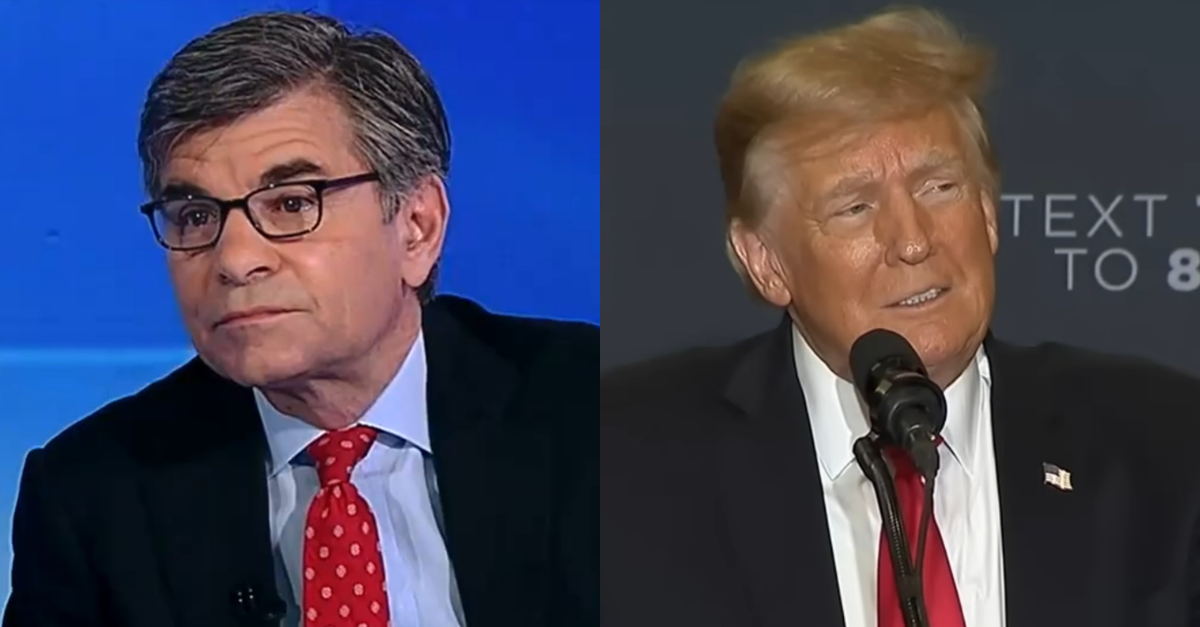
George Stephanopoulos and Donald Trump. (Screenshots: ABC)
In the ongoing court fight over former President Donald Trump’s defamation lawsuit against ABC, the TV network’s lawyers are working to buttress their argument to dismiss the complaint. Simply put, they argue that the ex-POTUS plaintiff is splitting hairs in claiming that host George Stephanopoulos defamed him when saying in a March 10 segment that Trump was “found liable for rape.”
From the filing made on Friday, citations removed:
Second, Plaintiff contends that this case is about “what the jury found” in Carroll II, while his Carroll I counterclaim was premised on Ms. Carroll’s “belief” about what happened. … But this is mere rhetorical sophistry – one could just as readily flip that description to characterize this case as being about what Mr. Stephanopoulos “believed” the jury had found and the other to be about what Ms. Carroll said actually happened. What is relevant for purposes of collateral estoppel is not how the parties’ counsel rhetorically frame their arguments, but rather whether the issue is presented in this case is identical to that in either or both of the Carroll cases. On that crucial point, Plaintiff offers no meaningful response. Nor could he. Both of the relevant decisions in the Carroll litigations, like this case, turn specifically on “what the jury found” in Carroll II. With respect to Plaintiff’s defamation counterclaim in Carroll I, Judge Kaplan held that the jury’s “finding on the sexual abuse question – and specifically its implicit determination that Mr. Trump digitally raped her – is conclusive with respect to this case. As a result, Ms. Carroll’s statements are ‘substantially true.’” … Likewise, in Carroll II, Judge Kaplan sustained the jury’s damages award solely based on “the jury’s implicit finding that Mr. Trump digitally raped Ms. Carroll.
Carroll and Trump faced off in two trials regarding separate complaints — one filed in 2019 and the other in 2022.
Trump’s lawsuit stems from the fallout of journalist E. Jean Carroll’s successful defamation lawsuit against the former president. The veteran writer said that Trump sexually assaulted her in a dressing room in the 1990s. He has repeatedly called her a liar even after jurors ruled in her favor. Jurors did decide that he did not rape her under the definition of New York state law, but federal judge Judge Lewis Kaplan rejected Trump’s motion for a new trial in part because the incident in question was “forcible digital penetration.” In other words, it might not be rape under the state law, but it was rape under many people’s understanding of the word.
“The finding that Ms. Carroll failed to prove that she was ‘raped’ within the meaning of the New York Penal Law does not mean that she failed to prove that Mr. Trump ‘raped’ her as many people commonly understand the word ‘rape,’” Kaplan wrote. “Indeed, as the evidence at trial recounted below makes clear, the jury found that Mr. Trump in fact did exactly that.”
Wow — Nancy Mace gets mad when George Stephanopoulos asks her how she can support Trump despite claiming to care about rape victims.
“You are trying to shame me this morning, and I think it’s disgusting,” she says.
But Stephanopoulos holds his ground! pic.twitter.com/JSMOpduIwT
— Aaron Rupar (@atrupar) March 10, 2024
In a filing made on May 24, Trump’s team reiterated their claim that Stephanopoulos misstated what jurors determined.
“Despite Defendants’ attempt to cast the allegations in the Complaint in a light that fits their theories of defense, this case is not about the difference between rape and sexual battery nor is it about Defendants’ attempts to minimize the significant distinctions that exist between these terms,” they wrote. “The claims, rather, relate to Defendants’ unmistakably untruthful, knowingly false, and defamatory statements as to what the jury in the Carroll II case actually determined.”
ABC’s counsel maintains “all of the challenged Statements are substantially true, given that there is no material difference between rape and sexual assault for purposes of defamation’.”
“Even if Plaintiff were not collaterally estopped from re-litigating whether it is substantially true that that the jury found him liable for rape, it would make no difference because it is substantially true,” they wrote.
More Law&Crime coverage: Jack Smith resubmits Trump gag order request with nominal changes — days after Mar-a-Lago judge ridiculed prosecution for poor lawyering
Have a tip we should know? [email protected]






